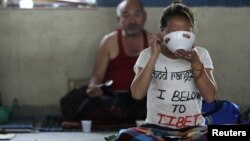A leading Tibetan exile group is reporting a massive security clampdown in the Tibetan capital, Lhasa, as Chinese security forces push to control community life in the aftermath of two Tibetan self-immolations on Sunday.
The Tibetan Center for Human Rights and Democracy quotes witnesses as saying that scores - and perhaps hundreds - of people have been rounded up for questioning in the isolated city since two young men set themselves on fire in an apparent protest against Chinese rule. The group told VOA's Tibetan service the police roundup includes anyone appearing on security video taken near the site of the protest. It was not clear Thursday how many people remain in police custody.
The two young men launched their fiery protest outside Lhasa's famed Jokhang Temple - the first such incident reported in the heavily guarded city. State media say one of the protesters died at the scene, while the other was hospitalized.
Details of the crackdown in the isolated capital emerged just hours after a 33-year-old Tibetan mother of three died in Sichuan province after setting herself on fire in a separate protest against Chinese rule. The woman died in front of the Jonang Dzamthang monastery in a prefecture known by Tibetans as Ngaba.
The head of the Jonang Welfare Association, Tsangyang Gyatso, said the woman was a neighbor of three young Tibetans who set themselves on fire earlier this year while demanding the safe return of their exiled spiritual leader, the Dalai Lama.
Anti-China protests have rocked southwestern China and neighboring Tibet for the past 14 months, as Buddhist monks, nuns and their supporters push their demands for freedom and the return of the Dalai Lama. At least 37 people have set themselves on fire since then in Sichuan and the adjoining Tibetan Autonomous Region, and more than 20 of those protesters have died.
John Powers, a professor of Asian studies at Australian National University, told VOA that many Tibetans feel the self-immolations are necessary because an unofficial state of martial law in their region has restricted other ways of expressing dissatisfaction.
"The Chinese state has upped the level of oppression so much that now it's really only possible to stage individual protests, and that's one of the reasons why these very public, very dramatic self-immolations are taking place - because the Tibetans really have no other options," said Powers.
China says the immolations incite separatism and are directed from outside the country. But representatives of the Dalai Lama, who lives in northern India, say protesters are driven to self-immolate in large part because they can no longer tolerate Beijing's ongoing push against Tibetan culture and religion.
This week's immolations follow a new Chinese move to ban Tibetan Buddhists, including current and former government officials, students, and party members, from engaging in religious practices during the sacred month of Saka Dawa, which began May 21. Saka Dawa commemorates the Buddha's birth, enlightenment and death.
The Tibetan Center for Human Rights and Democracy quotes witnesses as saying that scores - and perhaps hundreds - of people have been rounded up for questioning in the isolated city since two young men set themselves on fire in an apparent protest against Chinese rule. The group told VOA's Tibetan service the police roundup includes anyone appearing on security video taken near the site of the protest. It was not clear Thursday how many people remain in police custody.
The two young men launched their fiery protest outside Lhasa's famed Jokhang Temple - the first such incident reported in the heavily guarded city. State media say one of the protesters died at the scene, while the other was hospitalized.
Details of the crackdown in the isolated capital emerged just hours after a 33-year-old Tibetan mother of three died in Sichuan province after setting herself on fire in a separate protest against Chinese rule. The woman died in front of the Jonang Dzamthang monastery in a prefecture known by Tibetans as Ngaba.
The head of the Jonang Welfare Association, Tsangyang Gyatso, said the woman was a neighbor of three young Tibetans who set themselves on fire earlier this year while demanding the safe return of their exiled spiritual leader, the Dalai Lama.
Anti-China protests have rocked southwestern China and neighboring Tibet for the past 14 months, as Buddhist monks, nuns and their supporters push their demands for freedom and the return of the Dalai Lama. At least 37 people have set themselves on fire since then in Sichuan and the adjoining Tibetan Autonomous Region, and more than 20 of those protesters have died.
John Powers, a professor of Asian studies at Australian National University, told VOA that many Tibetans feel the self-immolations are necessary because an unofficial state of martial law in their region has restricted other ways of expressing dissatisfaction.
"The Chinese state has upped the level of oppression so much that now it's really only possible to stage individual protests, and that's one of the reasons why these very public, very dramatic self-immolations are taking place - because the Tibetans really have no other options," said Powers.
China says the immolations incite separatism and are directed from outside the country. But representatives of the Dalai Lama, who lives in northern India, say protesters are driven to self-immolate in large part because they can no longer tolerate Beijing's ongoing push against Tibetan culture and religion.
This week's immolations follow a new Chinese move to ban Tibetan Buddhists, including current and former government officials, students, and party members, from engaging in religious practices during the sacred month of Saka Dawa, which began May 21. Saka Dawa commemorates the Buddha's birth, enlightenment and death.







